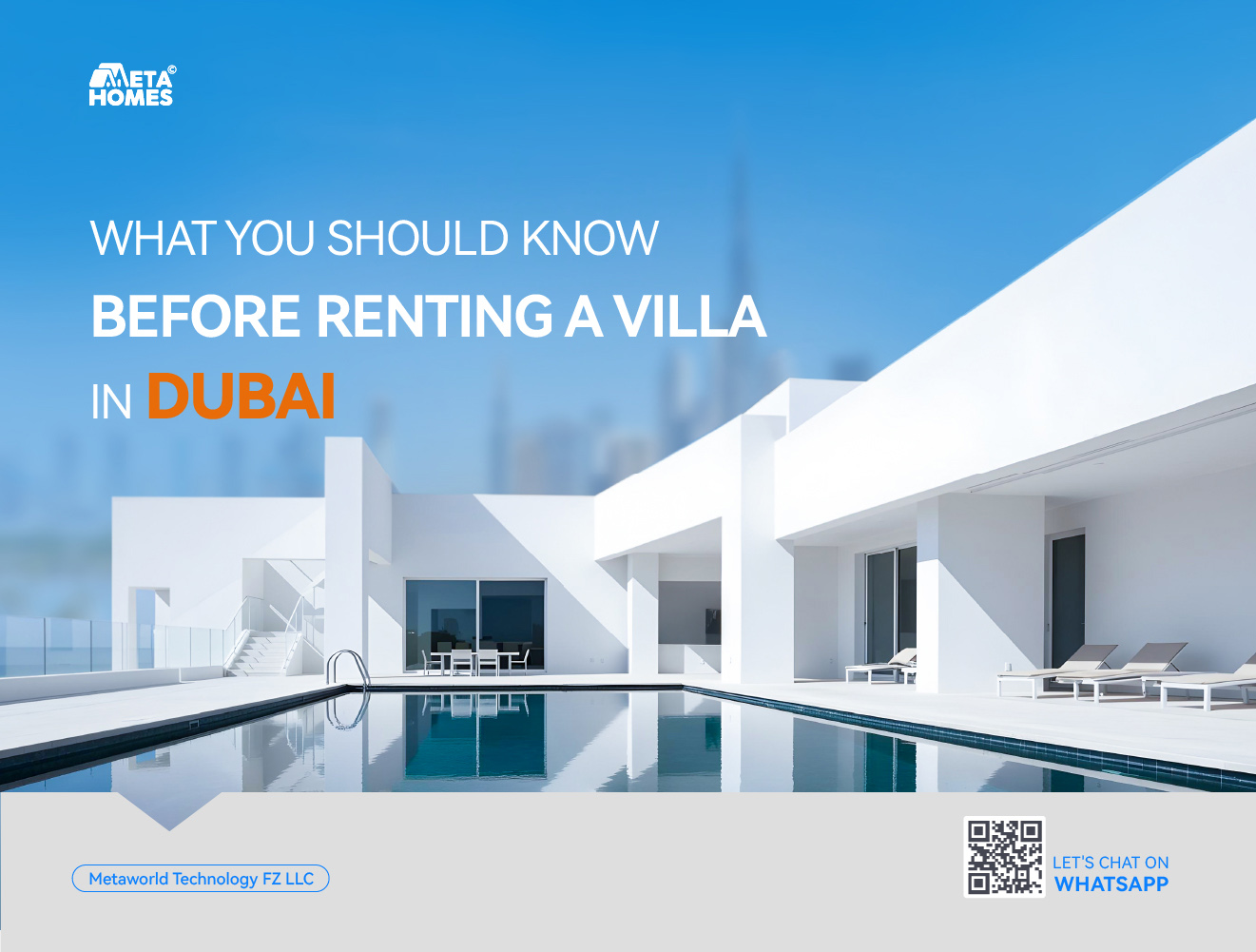
The rental market in Dubai is unique. Renting a villa in Dubai sounds exciting, and it is.
Laws, costs, and even community regulations are considerably different from what many people are used to back in their home countries.
You need to think about more than simply how big the villa is or how nice the inside is. You also need to think about how it will work in real life.
How much money do you have, and does it cover more than simply the rent? Which area or community is ideal for your way of life?
What legal documents do you need to get ready? And are you aware of the extra responsibilities that come with maintaining a villa compared to an apartment?
If you get these things right from the start, you’ll feel a lot less stressed later. Renting a property in Dubai can be easy and lucrative, but only if you take the time to learn how it works and make smart decisions.
1. Setting a Realistic Budget
When people think about renting a house in Dubai, the first thing that comes to mind is the rent itself.
But your rent is just one part of the total cost of living in a villa. If you only plan around the monthly rent, you might find yourself caught off guard later.
For example, villas usually come with bigger spaces, which means higher utility bills. Cooling a 4-bedroom villa in the summer can cost much more than running the AC in a small apartment.
Add to that water bills for gardens or pools, and your monthly expenses quickly go up.
You’ll also need to consider things like:
DEWA (Dubai Electricity and Water Authority) deposits and monthly bills – larger homes = higher utilities.
Cooling fees – in some communities, you’ll pay for district cooling, which is separate from DEWA.
Maintenance – while some landlords cover it, in other cases, you may be responsible for minor repairs.
Security deposits and agent fees – usually one month’s rent as a security deposit, plus a 5% agency commission.
Service charges – in gated communities, service fees may be included in the rent or billed separately.
So, before choosing a villa, take a hard look at your total financial picture. When you add up all the extras, a property that seems cheap on paper can end up costing you more than you planned.
In Dubai, a reasonable rule of thumb is to spend no more than 30–35% of your monthly salary on rent and housing costs. This way, you’ll still have room to save money, have fun, and pay for things that come up.
2. Picking the Right Location
After you set your budget, the next important choice is where to live. Where you live in Dubai can have a big impact on how you live.
There are villas all around the city, from calm suburban neighbourhoods to busy, upscale neighbourhoods.
It’s not just about the house itself when you choose the correct region; it’s also about how the place fits into your daily life.
When choosing a place, you should think about these important things:
Close to schools and work
Traffic in Dubai can be unpredictable, so plan your trip ahead of time. If you have kids, think about how far away the schools are and if there are reliable school bus routes.
You might save money on rent by living in a villa an hour away from work or school, but it could also take up a lot of your time and energy.
Lifestyle in the community
There are diverse vibes in different villa communities in Dubai. For example, Arabian Ranches, The Springs, and Damac Hills villas for rent are all popular with families who want to live in a peaceful, suburban area.
If you want something high-end, the Palm Jumeirah or the Jumeirah Islands are great places to live by the beach.
Mirdif or Al Barsha might be better for people who want something more central and less expensive.
There are parks, gyms, community centres, and even supermarkets in every neighbourhood. Consider what matters most to you: being close to the city, having peace and quiet, or being close to office areas.
Easy Access
Make sure the region is easy to get to from major routes like Emirates Road, Al Khail Road, or Sheikh Zayed Road.
This can change a lot about how you live your life every day. If you use public transport, keep in mind that certain villa communities in Dubai are not close to metro stations.
Facilities nearby
Keep an eye out for hospitals, grocery stores, restaurants, and malls, and make sure that they are nearby
It’s advisable to have things you need every day close by, especially if you don’t want to drive everywhere.
Some villa communities are still under construction, so you might be able to rent one for less. But it could also mean living with construction going on all the time or having fewer facilities at first.
In summary, where you live will have a bigger effect on your life than you believe. The villa itself might be nice, but if it’s in the wrong place, life could get unpleasant.
To really get a sense for the place, it’s always a good idea to walk around the neighbourhood, talk to people who live there, and even go there at different times of the day.
3. Understand the Lease Terms and Legalities
Anyone renting a villa in Dubai needs to know the rules and legal requirements that come with it.
If you skip this step, you could end yourself with extra stress, arguments, or even fines. Knowing what you can and can’t do ahead of time makes everything go more smoothly.
Here is what you should pay attention to:
Registering for Ejari
Every tenancy contract in Dubai must be registered through Ejari, the official system managed by the Dubai Land Department.
Ejari makes your lease official and protects both you and the landlord. You can’t connect utilities like DEWA without it, and it makes settling disputes a lot harder.
Deposit for security
Most landlords want a security deposit that can be returned. This is usually 5% of the yearly rent for unfurnished villas and 10% for furnished ones.
Before you move in, always take pictures or videos of the villa so you can show how it is. This helps keep things from getting messy when you move out.
Terms of Rent Payment
Dubai residents commonly pay their rent with post-dated checks, occasionally one, two, or four checks for the whole year.
Make sure you know the timeline and what will happen if a payment is late. Not paying a bill can lead to fines or even jail time.
Who is responsible for maintenance
Your contract should make it clear who is in charge of repairs. Usually:
Landlord: Handles big repairs such as plumbing, air conditioning, and problems with the building.
Tenant: Takes care of modest repairs like fixing light fixtures, small leaks, or taking care of the garden.
Rent Hikes
The RERA Rental Index keeps track of rent increases. Landlords can’t just raise the rent whenever they want.
There is a legal maximum based on current market rates, and you have to get 90 days’ notice before any increase.
The Dubai Rental Index, which is regulated by RERA, tells landlords how much they can raise rent when a lease is up.
This keeps tenants safe from sudden, unreasonable rent increases. Check our previous blog Dubai RERA Rent Calculator: Check Allowable Rent Hike for more information about rental hikes in Dubai
Ending and renewing a rental contract
Most contracts last for a year. There may be fees, usually equal to one to two months’ rent, if you want to end the lease early. Before signing, you should also talk about the terms of the renewal.
Knowing these legal things ahead of time will keep you from being surprised and make sure your villa rental goes smoothly.
Check the Villa’s Size, Condition & Available Amenities
After you’ve decided on your budget, location, and legal issues, the following step is to make sure the villa fits your way of life.
There are villas of different shapes and sizes in Dubai, but even the best listing doesn’t always tell the whole story.
Here are some things to consider:
Layout and Space
Think about what you need right now and what might change in the next few years.
- How many bedrooms do you really need?
- Do you want a gym, a maid’s room, or a separate office?
- Is there enough room for family and friends to stay over?
If you pick the appropriate arrangement now, you won’t have to move again later.
The Villa’s Condition
Before you sign anything, make sure to look closely at the villa:
- Look for cracks or water damage on the walls and ceilings.
- Check the plumbing, electrical, and air conditioning systems.
- Check that doors and windows open and close correctly.
- Check out the kitchen and appliances.
Broken or old equipment could cost you more in the long run. Document everything with photos or videos. This keeps you safe when it’s time to leave.
Spaces outside
A lot of villas in Dubai have gardens, patios, or pools. These are great benefits, but they also need to be taken care of:
- Find out who is in charge of keeping the garden and pool clean.
- Make sure there is enough shade and seclusion.
- Be on the lookout for possible pest problems.
Community Services
Villas are generally in gated communities that have common amenities including pools, gyms, playgrounds, and security. Think about what is important to you and your family:
- Are there parks and places for youngsters to play?
- Is the neighbourhood safe and well-kept?
- Are there stores, cafes, or restaurants nearby that are easy to get to?
Parking and Storage Facilities
Check to see if the property has enough garage space or outside parking for your cars. Check for extra rooms, sheds, or cupboards if you need more space to store things.
Furnishing of Villa
Some villas in Dubai come with complete furniture, while others are partly furnished or even unfurnished
If you need to move in immediately, renting a furnished villa in Dubai is a good choice. If you want to make the space your own, renting an unfurnished villa is better.
By paying attention to these things ahead of time, you can be sure that the villa you move into will not only look attractive but also fit your way of life.



Leave a Reply